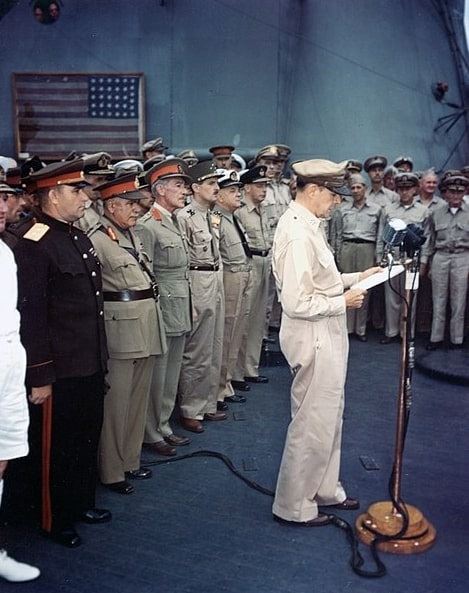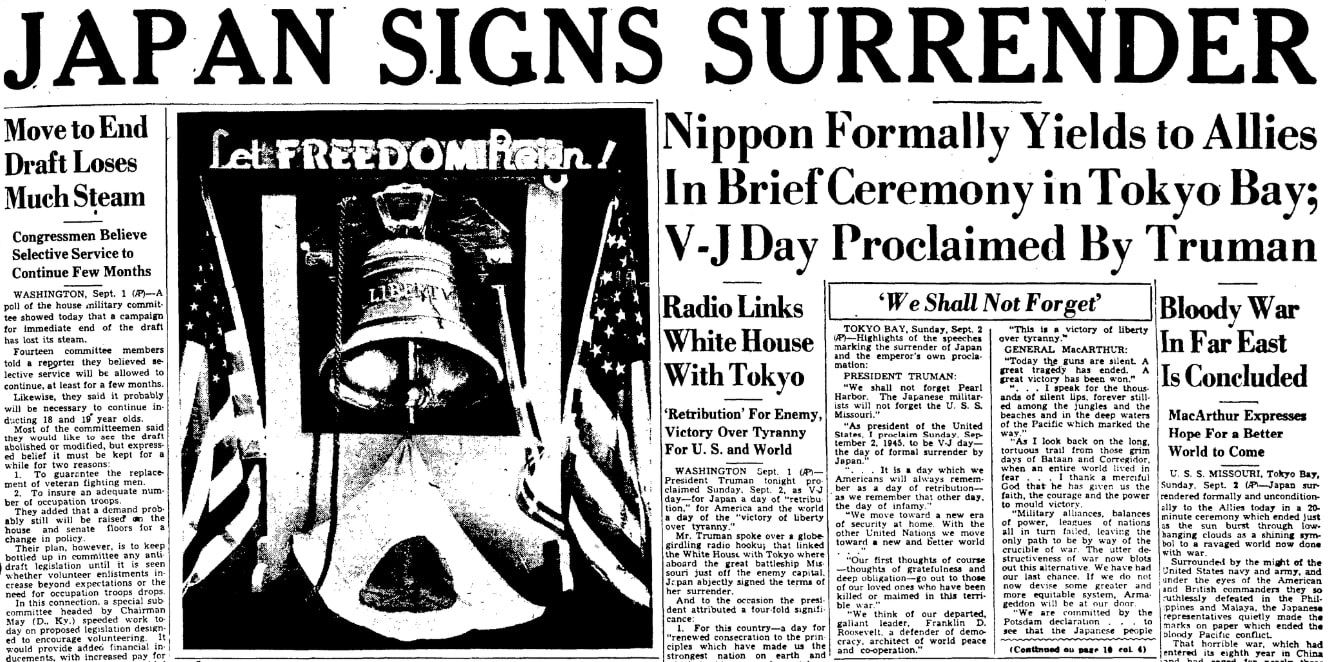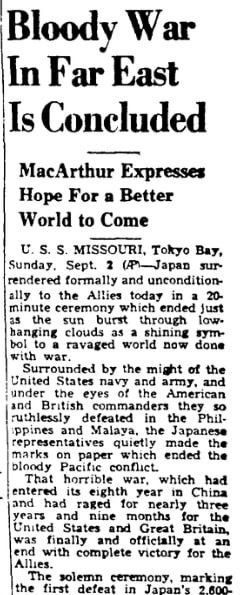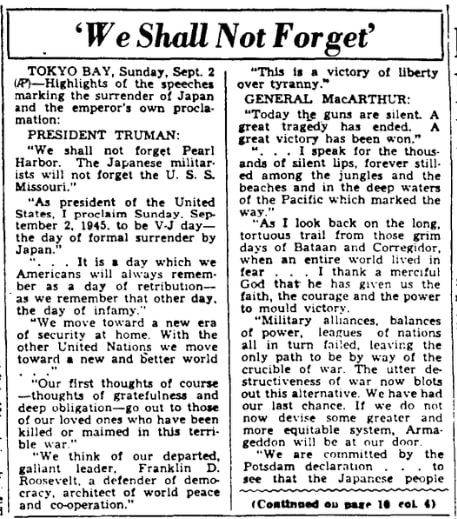When Germany unconditionally surrendered to the Western Allies and Russia on 7 May 1945, it seemed clear the death and destruction of WWII was finally coming to an end. The final task was to force Japan’s surrender, and then hostilities would cease. On June 21, after 82 days of some of the fiercest fighting of the war, the Battle of Okinawa ended – and with that victory the Allies gained a major base from which to launch an invasion of the Japanese homeland.

One month later, on July 26, allied leaders including U.S. President Truman issued the Potsdam Declaration warning that if Japan refused to surrender, “the inevitable and complete destruction of the Japanese armed forces and just as inevitably the utter devastation of the Japanese homeland” would follow. Japan did refuse and Truman made the decision to use atomic bombs, fearing an invasion of Japan would cost far too many lives.
On August 6 the city of Hiroshima was destroyed by this powerful new weapon, followed three days later by another atomic bomb dropped on Nagasaki. Realizing further resistance was futile, Emperor Hirohito gave a radio address to the Japanese people on August 15, announcing the surrender of Japan.
Eighteen days later, the formal surrender ceremony took place in Tokyo Bay on the deck of the U.S. battleship Missouri on 2 September 1945.

The 23-minute ceremony was a somber occasion. Along with representatives from Japan, the Japanese Instrument of Surrender was signed, in order, by the United States, China, United Kingdom, Soviet Union, Australia, Canada, France, Netherlands, and New Zealand. The world’s long nightmare was finally over.
Japan’s surrender was front-page news in papers across the country. Here is the front page of the Augusta Chronicle that day.

That front page featured two articles describing the signing ceremony. The first is a news account from a reporter who gives a wealth of detail about the actual surrender ceremony. The second article provides highlights from some of the major speeches marking the occasion.

Here is a transcription of this article:
JAPAN SIGNS SURRENDER
Nippon Formally Yields to Allies in Brief Ceremony in Tokyo Bay;
V-J Day Proclaimed by Truman
Bloody War in Far East Is Concluded
MacArthur Expresses Hope for a Better World to Come
U.S.S. MISSOURI, Tokyo Bay, Sunday, Sept. 2 (AP) – Japan surrendered formally and unconditionally to the Allies today in a 20-minute ceremony which ended just as the sun burst through low-hanging clouds as a shining symbol to a ravaged world now done with war.
Surrounded by the might of the United States navy and army, and under the eyes of the American and British commanders they so ruthlessly defeated in the Philippines and Malaya, the Japanese representatives quietly made the marks on paper which ended the bloody Pacific conflict.
That horrible war, which had entered its eighth year in China and had raged for nearly three years and nine months for the United States and Great Britain, was finally and officially at an end with complete victory for the Allies.
The solemn ceremony, marking the first defeat in Japan’s 2,600-year-old semi-legendary history, took place aboard this mighty battleship with 12 signatures which required only a few minutes to affix to the articles of surrender.
On behalf of Emperor Hirohito, Foreign Minister Mamoru Shigemitsu signed first for Japan. He doffed his top hat, tinkered with the pen and then firmly affixed his signature to the surrender document, a paper about 12 by 18 inches.
Shigemitsu carefully signed the American copy first, then affixed his name to a duplicate copy to be retained by Japan.
Wipes Tears
Following him, General Yoshijiro Umezu, of the Japanese imperial general staff, sat down resolutely, and scrawled his name on the documents as if in a tremendous hurry.
A Japanese colonel present was seen to wipe tears from his eyes as the general signed. All the Japanese looked tense and weary.
Shigemitsu looked on anxiously as Umezu signed.
General MacArthur was next to sign, as supreme Allied commander, on behalf of all the victorious Allied powers.
MacArthur immediately called for Lieutenant General Jonathan Wainwright of Bataan and Corregidor and Lieutenant General Sir Arthur Percival of Singapore to step forward.
These two defeated Allied commanders, now savoring their hour of triumph, stepped up, and Wainwright helped MacArthur take his seat.
MacArthur signed the documents with five pens.
The first he handed immediately to General Wainwright, the second to General Percival.
The third was a shipboard navy issue pen.
MacArthur then produced a fourth pen, presumably to be sent to President Truman.
Then he completed his signatures with still a fifth, possibly a trophy to be retained by himself.
Generals Wainwright and Percival, both obviously happy, saluted snappily.
They were followed by serene-faced Admiral Nimitz, who signed on behalf of the United States.
China Signs
Next came China’s representative.
General MacArthur acted as a brisk master of ceremonies. He made a brief introductory statement before the Japanese signed, then called upon each nation’s signer in turn to step forward.
The United Kingdom’s signature was followed by that of Soviet Russia.
The Russian staff officer signed quickly, scooting his chair into a more comfortable position even as he was signing.
MacArthur smiled approvingly as the Russian rose and saluted.
Quickly in turn, Australian, Canadian, French, Dutch and New Zealand representatives signed in that order.
The Australian, General Sir Thomas Blarney, happened to sign the Japanese copy first, with an expression that denoted it didn’t make any difference.
The scene in Tokyo Bay was largely obscured by clouds which hung fairly low amid the surrounding hills.
The flags of the United States, Britain, Russia, and China fluttered from the verandah deck of the Missouri. More than 100 high ranking military and naval officers of the Allies were in the colorfully-uniformed group watching the ceremony.
MacArthur, in his opening remarks, declared:
“It is my earnest hope and indeed the hope of all mankind that from this solemn occasion a better world shall emerge out of the blood and carnage of the past.”
Sun Breaks Through
Finally, after New Zealand’s signature, less than 20 minutes from the start of the ceremony, the sun broke through the clouds, and MacArthur formally and in a firm voice declared the proceedings closed.
The Japanese prepared to depart immediately, their bitter chore accomplished.
MacArthur informed the Japanese that “as supreme commander for the Allied powers I announce it my firm purpose in the tradition of the countries I represent to proceed in the discharge of my responsibilities with justice and tolerance, while taking all necessary dispositions to ensure that the terms of surrender are fully, promptly and faithfully complied with.”
All through this dramatic half hour, only those aboard the battleship knew of what was transpiring because the Missouri has no broadcasting facilities.
But recordings were rushed to the nearby communications ship Ancon, and the solemn words of MacArthur beginning the ceremony – “We are gathered here, representatives of the major warring powers” – were flashed around the world.
The hour for which all liberty-loving lands the world over had awaited for long and terrible years was at hand – V-J day was here.
Yet at the hour of triumph, the world was sobered by the knowledge of the price which civilization paid to achieve this day, and that theme rang through the messages of America’s commanders.
“Our first thoughts of course – thoughts of gratefulness and deep obligation – go out to those of our loved ones who have been killed or maimed in this terrible war,” President Truman told the world from a broadcasting room in the White House in Washington.
And there, where the Japanese warlords had once boasted they would dictate their own peace terms, Truman spoke these determined words:
“We shall not forget Pearl Harbor. The Japanese militarists will not forget the U.S.S. Missouri.”
And, after he had proclaimed the peace “a victory of liberty over tyranny,” the scene shifted back to this bay near Japan’s ruined capital where MacArthur told his countrymen:
“Today the guns are silent. A great tragedy has ended. A great victory has been won.”
For Silent Lips
The supreme Allied commander said he spoke “for the thousands of silent lips, forever stilled among the jungles and the beaches and in the deep waters of the Pacific which marked the way.
“As I look back on the long, tortuous trail from those grim days of Bataan and Corregidor,” he continued, “when an entire world lived in fear, when democracy was on the defensive everywhere, when modern civilization trembled in the balance, I thank a merciful God that he has given us the faith, the courage and the power from which to mould victory.”
Possibly thinking of the atomic bomb that hastened Japan’s decision to surrender, MacArthur declared that the war had become so utterly destructive that unless an equitable system of peace was devised “Armageddon will be at our door.”
Nimitz, speaking next and praising all branches of the services and the Allies, declared that the United Nations must “enforce rigidly the peace terms that will be imposed upon Japan.”
Out to Japanese field commanders went Emperor Hirohito’s orders, issued after the articles were signed, commanding “all my people forthwith to cease hostilities, to lay down their arms, and faithfully to carry out all the provisions of the instrument of surrender.”
By the signatures of his plenipotentiaries, the emperor accepted the terms of the Potsdam Declaration which called for the elimination “for all time” of those who led Japan to war, and stern justice for war criminals.
Now Japan’s sovereignty was limited to the will of the Allies, all her conquests were stripped away, and she was left completely disarmed.

Here is a transcription of this article:
‘We Shall Not Forget’
TOKYO BAY, Sunday, Sept. 2 (AP) – Highlights of the speeches marking the surrender of Japan and the emperor’s own proclamation:
President Truman:
We shall not forget Pearl Harbor. The Japanese militarists will not forget the U.S.S. Missouri.
As president of the United States, I proclaim Sunday, September 2, 1945, to be V-J day – the day of formal surrender by Japan.
…It is a day which we Americans will always remember as a day of retribution – as we remember that other day, the day of infamy.
We move toward a new era of security at home. With the other United Nations we move toward a new and better world…
Our first thoughts of course – thoughts of gratefulness and deep obligation – go out to those of our loved ones who have been killed or maimed in this terrible war.
We think of our departed, gallant leader, Franklin D. Roosevelt, a defender of democracy, architect of world peace and cooperation.
This is a victory of liberty over tyranny.
General MacArthur:
Today the guns are silent. A great tragedy has ended. A great victory has been won.
…I speak for the thousands of silent lips, forever stilled among the jungles and the beaches and in the deep waters of the Pacific which marked the way.
As I look back on the long, tortuous trail from those grim days of Bataan and Corregidor, when an entire world lived in fear… I thank a merciful God that he has given us the faith, the courage and the power to mould victory.
Military alliances, balances of power, leagues of nations all in turn failed, leaving the only path to be by way of the crucible of war. The utter destructiveness of war now blots out this alternative. We have had our last chance. If we do not now devise some greater and more equitable system, Armageddon will be at our door.
We are committed by the Potsdam Declaration… to see that the Japanese people are liberated from this condition of slavery. It is my purpose to implement this commitment… The country can lift itself from its present deplorable state into a position of dignity.
To the Pacific basin has come the vista of a new emancipated world. Today, freedom is on the offensive, democracy is on the march.
And so, my fellow countrymen, today I report to you that your sons and daughters have served you well and faithfully with the calm, deliberate, determined fighting spirit of the American soldier and sailor… Against the fanaticism of an enemy supported only by mythological fiction.
Admiral Nimitz:
The long and bitter struggle which Japan started so treacherously on the Seventh of December, 1941, is at an end.
The officers and men of the United States army, navy, marine corps, coast guard and merchant marine who fought in the Pacific have written heroic new chapters in this nation’s military history… We also acknowledge the great contribution to this victory made by our valiant allies.
The port of Tokyo, which was first opened by Commodore Perry in 1853, is now crowded with United States men o’ war. The process of bringing Japan into the family of civilized nations, which was interrupted when Japan launched her program of conquest, will soon begin again.
…The United Nations (must) enforce rigidly the peace terms that will be imposed upon Japan. It will also be necessary to maintain our national strength at a level which will discourage future acts of aggression.
Emperor Hirohito:
Accepting the terms set forth in the declaration… on July 26, 1945, at Potsdam… I have commanded the Japanese imperial government and the Japanese imperial general headquarters to sign on my behalf the instrument of surrender…
I command all my people forthwith to cease hostilities, to lay down their arms, and faithfully to carry out all the provisions of the instrument of surrender and the general orders issued by the Japanese imperial general headquarters…
Note: An online collection of newspapers, such as GenealogyBank’s Historical Newspaper Archives, is not only a great way to learn about the lives of your ancestors – the old newspaper articles also help you understand American history and the times your ancestors lived in, and the news they talked about and read in their local papers. Did anyone in your family serve in WWII? Please share your stories with us in the comments section.
Related Articles:

My father was on the USS Mount Olympus (AGC 8), an amphibious assault command ship, that sailed into Tokyo Bay as the treaty was being signed. We have, in addition to his letters and photographs he took, a copy of the San Francisco Chronicle from VJ Day that my mother saved.
Nice to have the family mementos and the larger historical context through the lens of newspapers.